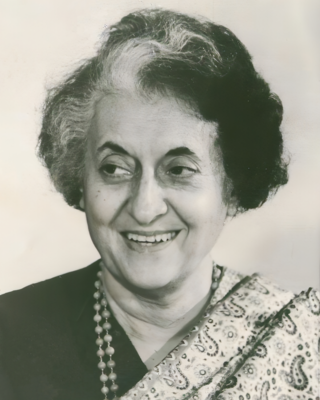
Indira Gandhi was an Indian politician who served as the third Prime Minister of India from 1966 to 1977 and again from 1980 until her assassination in 1984. She was India's first and, to date, only female prime minister, and a central figure in Indian politics as the leader of the Indian National Congress. Gandhi was the daughter of Jawaharlal Nehru, the first prime minister of India, and the mother of Rajiv Gandhi, who succeeded her in office as the country's sixth prime minister. Furthermore, Gandhi's cumulative tenure of 15 years and 350 days makes her the second-longest-serving Indian prime minister after her father. Henry Kissinger described her as an "Iron Lady", a nickname that became associated with her tough personality since her lifetime.

The Indian National Congress (INC), colloquially the Congress Party or simply the Congress, is a political party in India with deep roots in most regions of India. Founded on 28 December 1885, it was the first modern nationalist movement to emerge in the British Empire in Asia and Africa. From the late 19th century, and especially after 1920, under the leadership of Mahatma Gandhi, the Congress became the principal leader of the Indian independence movement. The Congress led India to independence from the United Kingdom, and significantly influenced other anti-colonial nationalist movements in the British Empire.

The Janata Party abbreviated JP, lit. People's Party) is an unrecognized political party in India. It was founded as an amalgam of Indian political parties opposed to the Emergency that was imposed between 1975 and 1977 by Prime Minister Indira Gandhi of the Indian National Congress. In the 1977 general election, the party defeated the Congress and Janata leader Morarji Desai became the first non-Congress prime minister in independent modern India's history.

Sanjay Gandhi was an Indian politician and the younger son of Indira Gandhi and Feroze Gandhi. He was a member of parliament, Lok Sabha and the Nehru–Gandhi family.
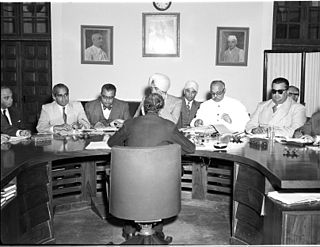
Rajpramukh was an administrative title in India which existed from India's independence in 1947 until 1956. Rajpramukhs were the appointed governors of certain Indian provinces and states.

The Emergency in India was a 21-month period from 1975 to 1977 when Prime Minister Indira Gandhi had a state of emergency declared across the country.
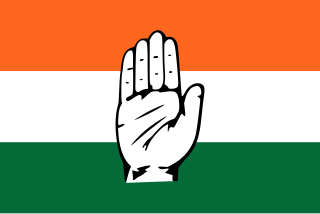
The Indian National Congress was established when 72 representatives from all over the country met at Bombay in 1885. Prominent delegates included Dadabhai Naoroji, Surendranath Banerjee, Badruddin Tyabji, Pherozeshah Mehta, W. C. Banerjee, S. Ramaswami Mudaliar, S. Subramania Iyer, and Romesh Chunder Dutt. The Englishman Allan Octavian Hume, a former British civil servant, was one of the founding members of the Indian National Congress.
Devaraj Devaraj Urs was an Indian politician who served two terms as the first Chief Minister of Karnataka, a state in southern India. He is also the longest serving Chief Minister of Karnataka in terms of days of tenure in office. He entered politics in 1952 and was an MLA for 10 years. When the Indian National Congress split in 1969 as Samstha and Indira Congress, he stood with Indira Gandhi. He became the Chief Minister of Karnataka for the first time from 20 March 1972 to 31 December 1977 and later for the second time from 17 March 1978 to 8 June 1980.

Poverty in India remains a major challenge despite overall reductions in the last several decades as its economy grows. According to an International Monetary Fund paper, extreme poverty, defined by the World Bank as living on US$1.9 or less in purchasing power parity (PPP) terms, in India was as low as 0.8% in 2019, and the country managed to keep it at that level in 2020 despite the unprecedented COVID-19 outbreak. According to the World Bank, India experienced a significant decline in the prevalence of extreme poverty from 22.5% in 2011 to 10.2% in 2019. A working paper of the bank said rural poverty declined from 26.3% in 2011 to 11.6% in 2019. The decline in urban areas was from 14.2% to 6.3% in the same period. The poverty level in rural and urban areas went down by 14.7 and 7.9 percentage points, respectively. According to United Nations Development Programme administrator Achim Steiner, India lifted 271 million people out of extreme poverty in a 10-year time period from 2005–2006 to 2015–2016. A 2020 study from the World Economic Forum found "Some 220 million Indians sustained on an expenditure level of less than Rs 32 / day—the poverty line for rural India—by the last headcount of the poor in India in 2013."
The Sampoorna Grameen Rozgar Yojana was a scheme launched by the Government of India to gain the objective of providing gainful employment for the rural poor. From 21 February 2003, EAS became an allocation-based scheme. The programme was implemented through the Panchayati Raj institutions.

Below Poverty Line is a benchmark used by the government of India to indicate economic disadvantage and to identify individuals and households in need of government assistance and aid. It is determined using various parameters which vary from state to state and within states. The present criteria are based on a survey conducted in 2002. Going into a survey due for a decade, India's central government is undecided on criteria to identify families below poverty line.

Pradhan Mantri Gramin Aawas Yojana, previously Indira Awas Yojana, is a social welfare programme, created by the Indian Government, to provide housing for the rural poor in India. A similar scheme for urban poor was launched in 2015 as Housing for All by 2022. Indira Awas Yojana was launched in 1985 by Rajiv Gandhi, the Prime Minister of India, as one of the major flagship programs of the Ministry of Rural Development to construct houses for the Below Poverty Line population in the villages.
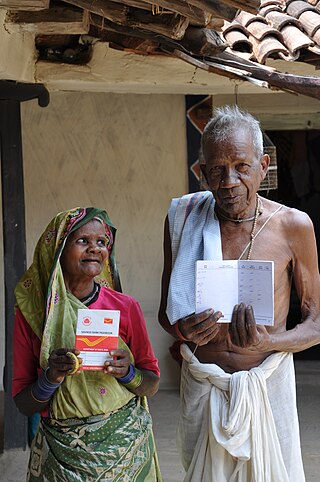
The National Social Assistance Programme (NSAP) is a Centrally Sponsored Scheme of the Government of India that provides financial assistance to the elderly, widows and persons with disabilities in the form of social pensions. The NSAP scheme only includes Below Poverty Line individuals as beneficiaries.
Statistics on unemployment in India had traditionally been collected, compiled and disseminated once every ten years by the Ministry of Labour and Employment (MLE), primarily from sample studies conducted by the National Sample Survey Office. Other than these 5-year sample studies, India had historically not collected monthly, quarterly or yearly nationwide employment and unemployment statistics on a routine basis. In 2016, the Centre for Monitoring Indian Economy, a non-governmental entity based in Mumbai, started sampling and publishing monthly unemployment in India statistics.
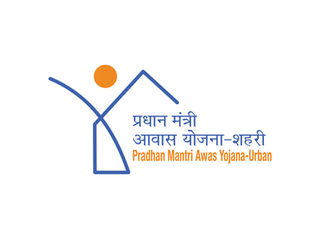
Pradhan Mantri Awas Yojana (PMAY) is a credit-linked subsidy scheme by the Government of India to facilitate access to affordable housing for the low and moderate-income residents of the country. It envisaged a target of building 2 crore (20 million) affordable houses by 31 March 2022. It has two components: Pradhan Mantri Awas Yojana(Urban) (PMAY-U) for the urban poor and Pradhan Mantri Awaas Yojana (Gramin) (PMAY-G and also PMAY-R) for the rural poor, the former administered by Ministry of Housing and Urban Affairs and the latter by Ministry of Rural Development. This scheme converges with other schemes to ensure that houses have a toilet, Saubhagya Scheme for universal electricity connection, Ujjwala Yojana LPG connection, access to drinking water and Jan Dhan banking facilities, etc.

The Third Ashok Gehlot ministry is the state cabinet of the Indian state of Rajasthan in the 15th Rajasthan Legislative Assembly headed by Chief Minister Ashok Gehlot.

The economic policy of the Indira Gandhi premiership was characterized by moderate tax increases on higher income Indians, bank nationalisation, and the green revolution. Gandhi presided over three Five-Year Plans as Prime Minister, two of which succeeded in meeting the targeted growth.

The Domestic policy of the Indira Gandhi government was the domestic policy of India from 1966 to 1984 during the premiership of Indira Gandhi until her assassination in 1984. Designed to covers a wide range of areas, including to increased focus on developing national security, social welfare, economic and social affair, money and taxes.
The Grand Alliance of 1971 was a pre-poll alliance forged between Indian National Congress (Organisation), Samyukta Socialist Party, Praja Socialist Party, Swatantra party and Bharatiya Jana Sangh ahead of the 1971 Indian general election. The alliance was led by K. Kamaraj's INC (O) faction against Indira Gandhi's INC (R) faction. However, in the end INC (R) won the election.













